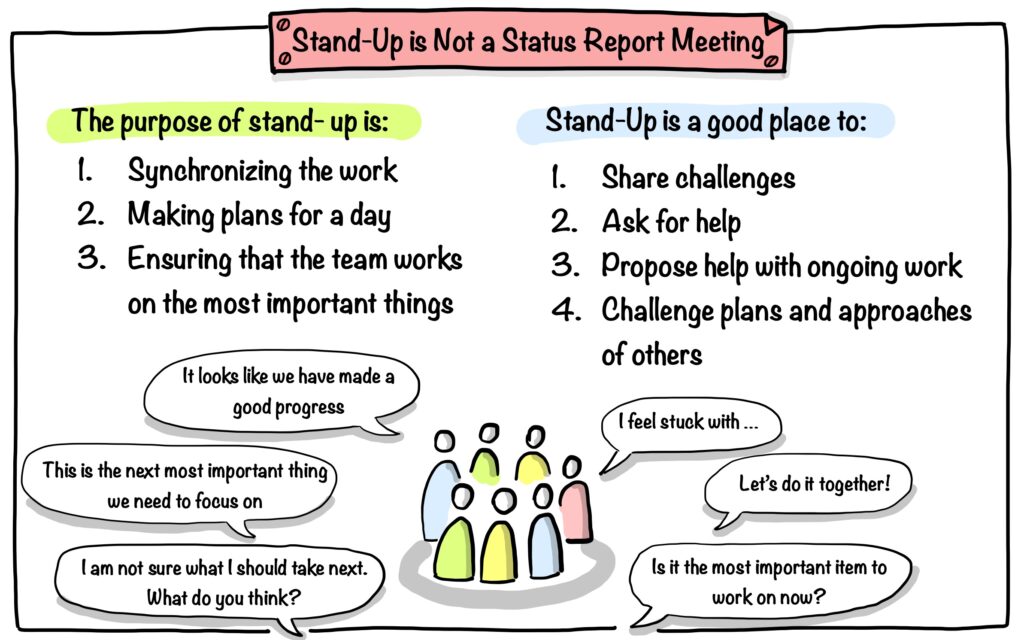
- Stand-Up Purpose
- Questions of Traditional Stand-Up (aka Status Report Meeting)
- Ideas for More Valuable Stand-Ups
- Possible Questions to Ask During Stand-Ups
- Social Aspect of Stand-Ups
- Key Points
Stand-Up Purpose
The purpose of stand-up is:
- Synchronizing the work of a team
- Making plans for the upcoming day
- Ensuring that the team works on the most important things
Stand-up is a good place to:
- Share challenges
- Ask for help or an advice
- Propose help with ongoing tasks before taking the new one (especially if the priority of it is lower )
- Challenge plans or approaches of other team members to ensure that the whole team works on the most important things
However, many stand-ups serve rather the purpose of status report meetings.
Questions of Traditional Stand-Up (aka Status Report Meeting)
Many stand-ups resemble traditional status report meetings where people, in turns, answer those 2 questions:
- What have I been doing since the last stand-up?
- What will I do next?
Those questions are not good or bad; they are just not the only option. If you feel that answering these questions makes sense for your team, it is okay; just be reasonable in answering them – to make it valuable for the whole team. Also, experiment with asking other questions during stand-ups.
Typical Problems with Answering Stand-Up Questions
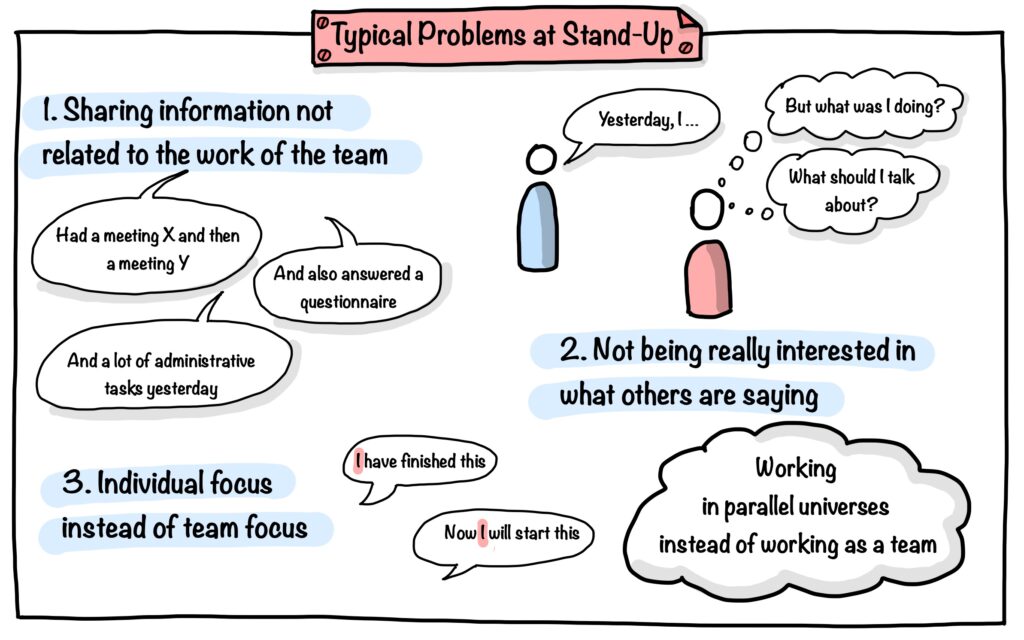
Question 1. What have I been doing since the last stand-up?
Answering this question, team members share their progress since the last stand-up, and usually, this information provides certain value to their team members.
Problem 1: Sharing information not related to the work of the team
However, sometimes answers are like this:
- ”A lot of meetings yesterday“
- “Had a meeting with X and then a meeting with Y”
- “Prepared to a meeting Z/1-on-1/Retrospective“
- “Was writing feedback“
- “Due to all these meetings, I have not done much actual work”
- “Let me think, what else I was doing…“
And while those things might be mentioned occasionally when people would like to explain why something that had been planned was not accomplished (which is still not necessary), in many cases, this information does not bring any value to the team. It just takes time, which might have been spent more wisely, to coordinate team efforts.
If the results of such activities do impact the team’s work (like agreements made during those meetings), then sure, share the outcomes, which are important for the whole team to know.
It is natural that people can be afraid of the image they might project if they don’t report a lot of activities done. Still, their team members know them well enough not to doubt their work ethics, and they believe by default in the good intentions of people in the team (and if that is not the case, then there is a deeper problem of trust in the team).
During stand-up, we should share the information that contributes to or directly impacts the team’s work and progress toward the goals, which is important for all the team members to know.
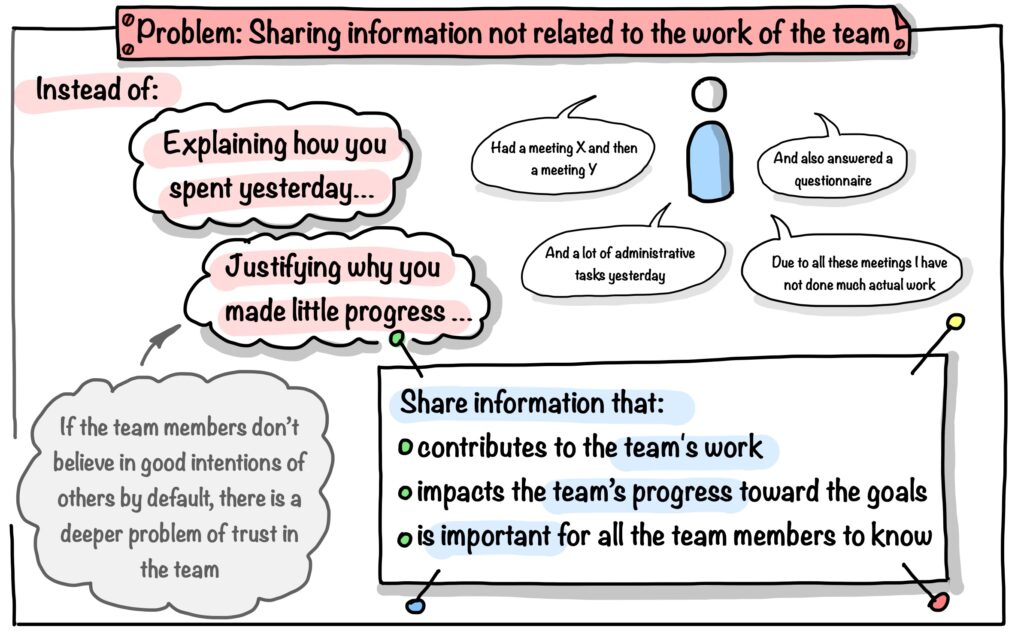
Question 2. What will I do next?
Sharing plans with team members is important for synchronizing and coordinating the work of the team.
Problem 2: Working in parallel universes instead of working as a team
However, sometimes team members do not listen much to what others are saying, being not quite interested in this information or just rehearsing what they will report about their progress and plans when their turn comes. Sometimes people answer this question as “I am not sure what task I can take next, I will check later.“ Or team members take some low-priority tasks because they don’t know how to deal with higher-priority ones or don’t want to.
Such team members are formally in the same team but, in reality, do their work in parallel. If team members don’t have a common goal, there is no need for a common stand-up.
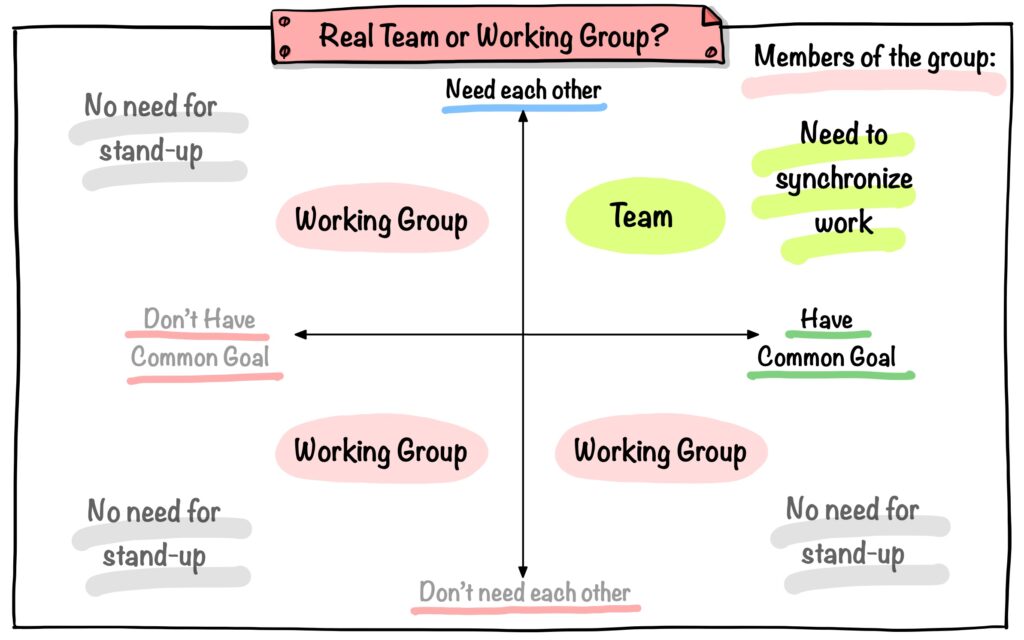
(The visualization of mapping of Real team vs. Working Group initially appeared in the article The First Question To Ask When Building Teams – Is This Really A Team by Stefan Lindbohm and Viktor Cessan)
Product development is a team sport. We are part of a team with a common goal. The whole team should be involved in deciding what is the next most important thing to focus on.
Discuss what you should start next with the team members if you are in doubt. Offer help to others with finishing already started work. Team up for pair work with somebody else on a high-priority task together (for knowledge sharing and to ensure better solutions for more complex system parts).
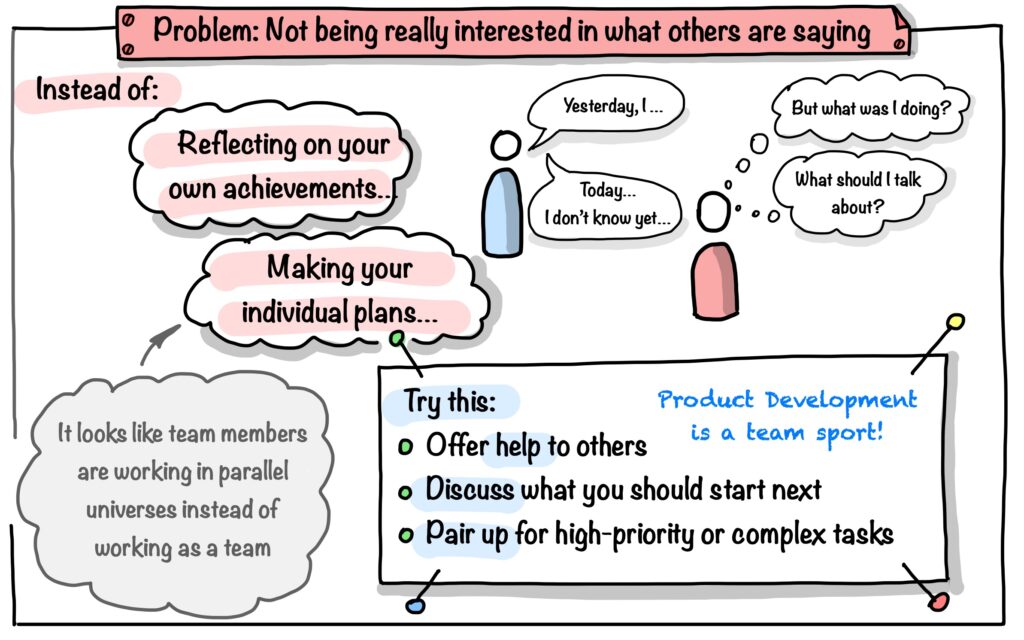
Problem 3. Individual focus instead of team focus
Team members usually report their individual accomplishments and plans: “I have finished this. Now I will start this.“
It is important to change the focus from individual accomplishments (individual tasks status reports) to the whole team’s progress, from “Me” to “Us”:
- “Now, when this task is done, we can start working on this”
- “This is the riskiest item, and we need to deal with it now”
- “This is the next most important thing we need to focus on“
Try going through items on the Kanban board, from right to left (remember: “Stop starting, start finishing!“), instead of people reporting in turns. Ensure that the work gets done instead of that people feel busy.
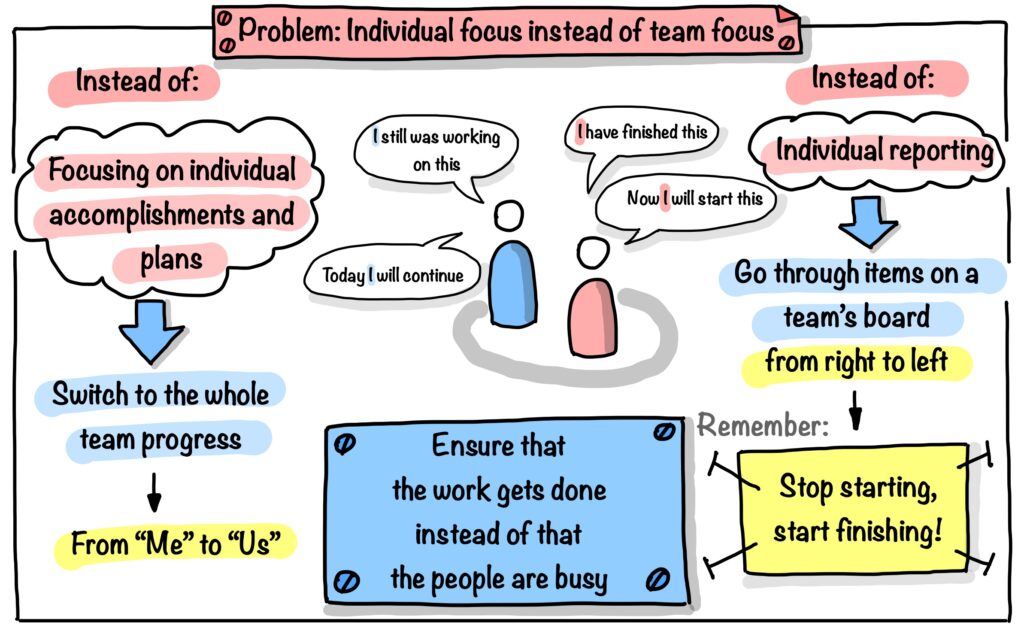
Ideas for More Valuable Stand-Ups
After stand-up, we need to be sure that we have a positive answer to a question: Are we moving in the right direction, doing the right things the right way?
Reminding goals and priorities at the beginning of stand-up will prime team members’ thinking toward those goals and help validate if the planned work contributes to achieving these goals and priorities.
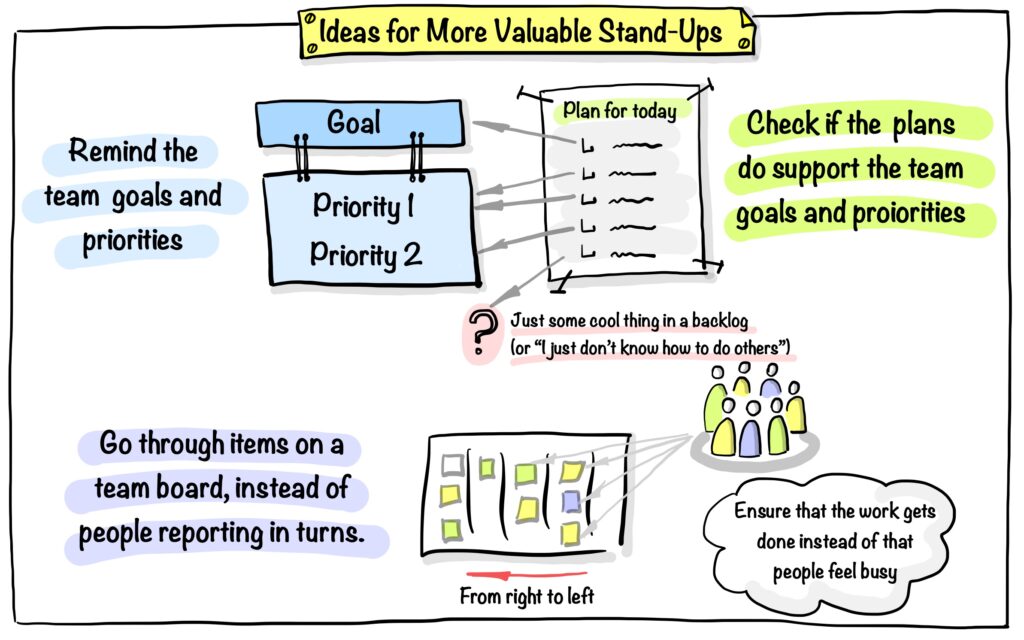
Ideas to try during stand-up facilitating might be:
- Reminding in the beginning:
- Goal
- Priorities (Priority nr. 1, Priority nr. 2)
- Checking in the end if the plans do support team goals and priorities, starting from the most important
- Going through items on a team board, from right to left, instead of people reporting in turns. Ensure that the work gets done instead of that people feel busy.
- Asking different questions to put a different focus
- Rotating facilitators for the diversity of styles
Possible Questions to Ask During Stand-Ups
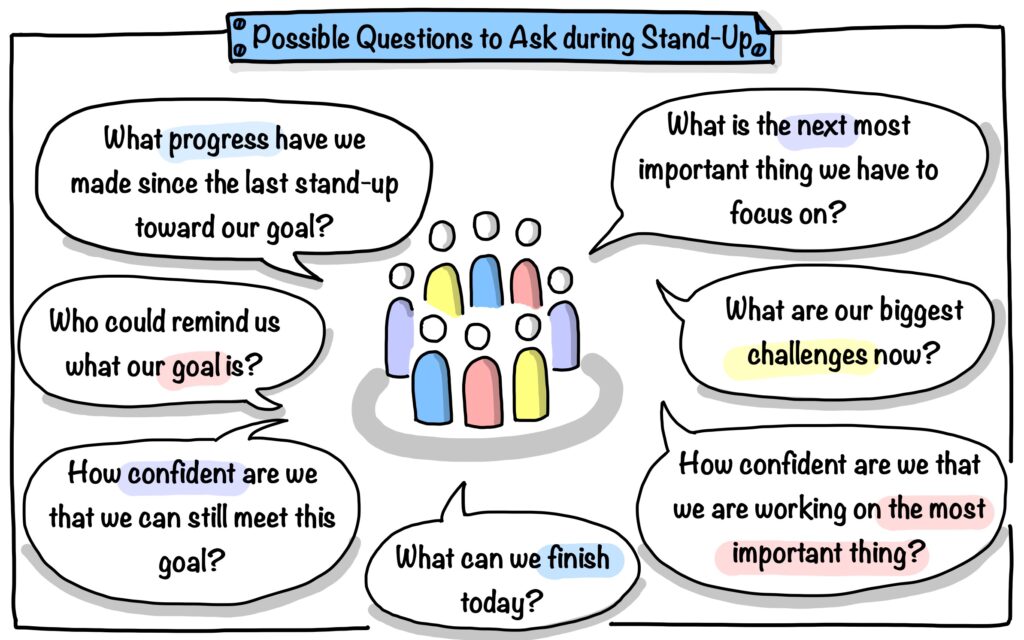
Try to ask those questions during your stand-ups:
- Who could remind us what our goal is (our priorities are)?
- What progress have we made since the last stand-up toward this goal?
- How confident are we that we can still meet this goal?
- What are our biggest challenges now? What are the riskiest parts?
- What can we finish today?
- How can we organize ourselves to finish this item before starting anything else?
- What is the next most important thing we have to focus on?
- How confident are we that we are working on the most important thing?
- On a scale from 1 to 5, how valuable was today’s stand-up for you?
- and then, if time allows, ask those with a score lower than 5: What could have made it 5 for you?
(not all of them at the same time)
For quantitative questions (“How confident we are…“) “Fist To Five“ voting is usually a good fit.

Social Aspect of Stand-Ups
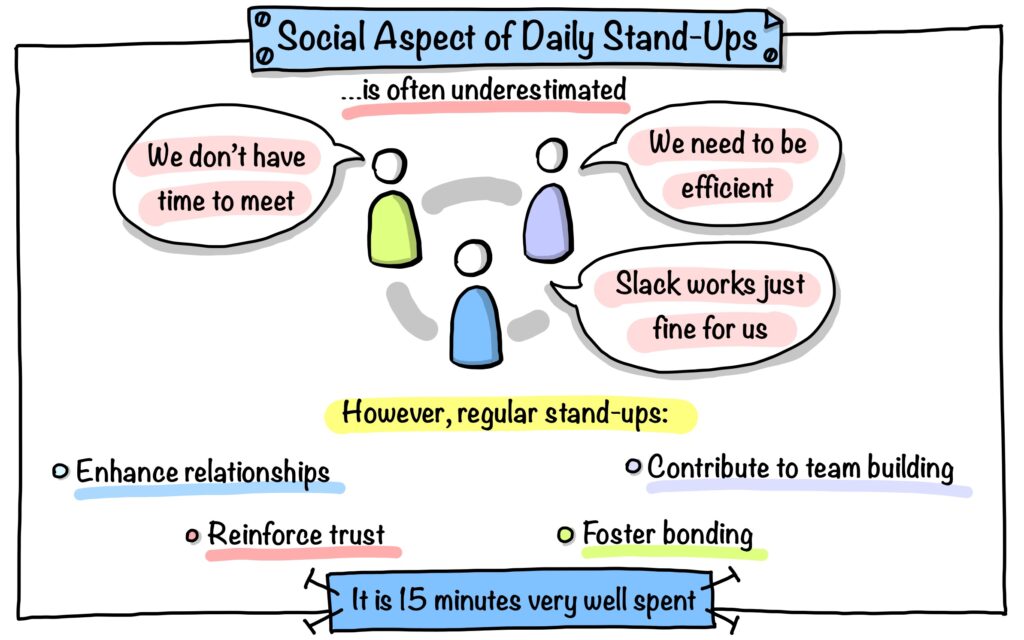
An often overlooked and underestimated aspect of daily stand-ups is their social, team-building, and bonding side.
The mere act of meeting regularly, seeing, and listening to each other contributes to the team relationship-building process. It reinforces trust step-by-step, allows for a better understanding of team members, in addition to obvious benefits such as increased effectiveness in planning and coordination.
I’ve observed that many teams who replace stand-ups with asynchronous status reporting or conduct synchronous stand-ups just once or twice per week, especially in remote environments, often lack team spirit and function more as a group of individuals rather than a cohesive team. How do they explain skipping stand-ups usually? ‘We don’t have time’ and ‘We need to be more efficient.’”
Well, if to take into account this bonding, relationship and trust building, it is 15 minutes not so badly spent.
Key Points
During stand-up:
- We need to validate that we are moving in the right direction, doing the right things the right way
- We have to ensure that we are working on the most important things
- We should bring the things that directly impact the work of the team
- It is important to change the focus from individual accomplishments (individual tasks status reports) to the whole team’s progress, from “Me” to “Us”
P.S. It is always beneficial to use the time when others are joining, or even the first couple minutes, for chit-chat (“watercooler conversation“) to make the start of the stand-up more friendly and less official.
See also:
All Posts about Teams
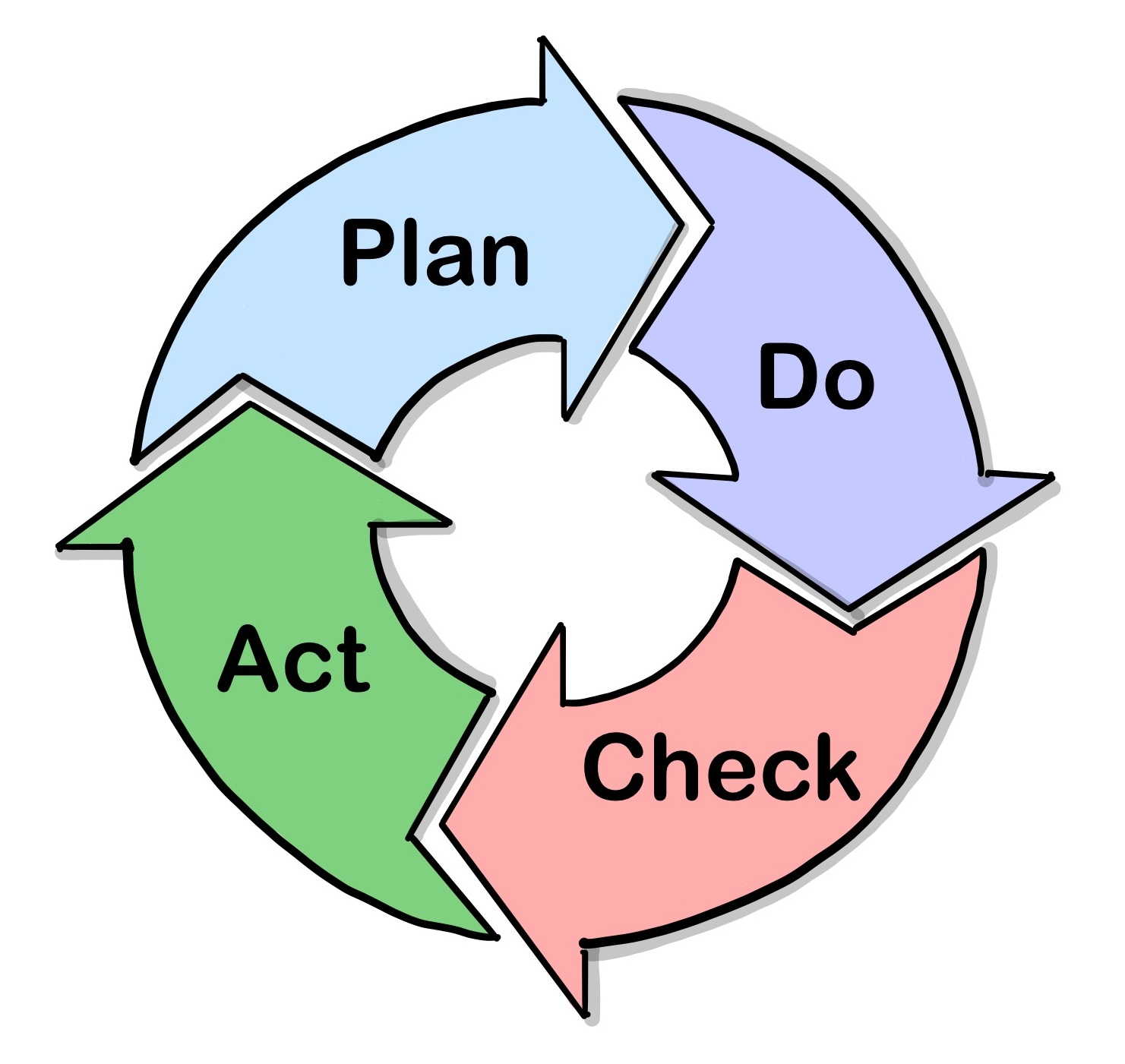
Leave a Reply